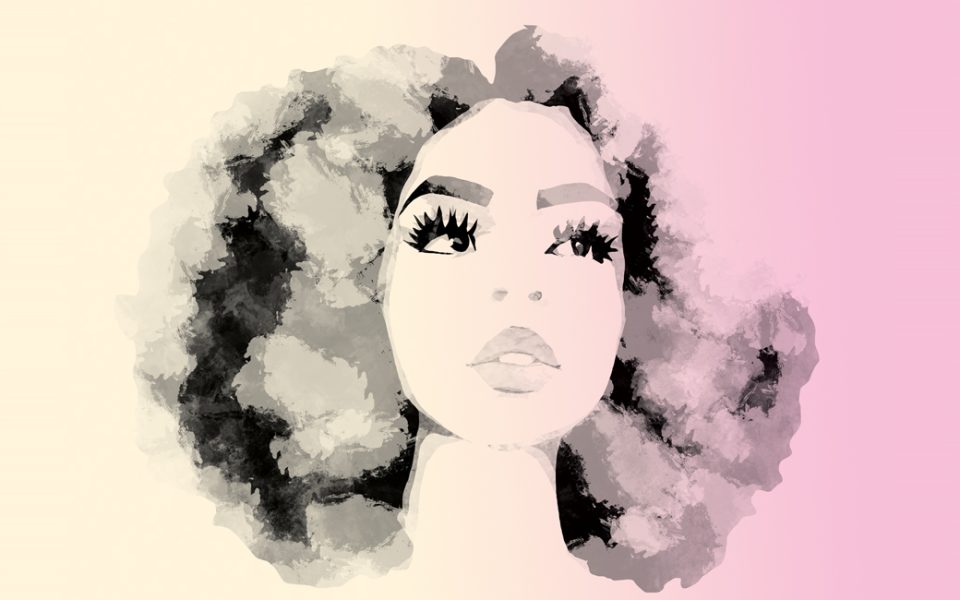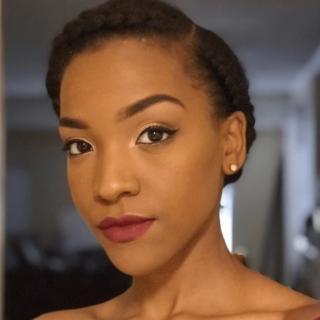Strands of stringy, limp hair sat at my feet as I stared in the mirror at my three-inch afro. It was 2015, and after 14 years of feeding my addiction to the “creamy crack” — chemical relaxers used to permanently straighten hair — I decided to go natural, finally embracing the way my hair naturally grew from my head. Gone were the days of Mama insisting on “bumping the ends” of my straight hair, only to spend Easter Sundays looking like James Brown. No more being asked to hold my ear while getting unrelaxed new growth touched up with the hot comb.
During the Civil Rights Movement, the afro became a political symbol of pride as Black people embraced their African ancestry. Angela Davis, political activist, rocked a picked-out afro and inspired others to do the same.
“When I came to A&T in like, ‘99, 2000 they called me Angela Davis because my ’fro was so big,” says Tiffany Roacher, lead loctician and owner of Naturally Free Natural Hair Lounge.
Roacher is on her second set of dreadlocks and has been growing them since 2010. She spends less time on her own locks than she does one client, whose microlocks took 22 hours to complete. After getting her first relaxer in seventh grade, Roacher experimented with a shoulder-length bob and singer T-Boz-inspired haircut. She decided to go natural after experiencing breakage at the line of demarcation — the point at which new growth and relaxed hair meet.

“As long as you get your relaxer for your senior pictures,” Roacher’s mom told her, “we’re good.” But Roacher had other plans.
“I didn’t get my relaxer for my senior pictures,” she says. “I absolutely fell in love with my natural hair.”
When I first went natural, I had no idea how to style my hair or what products to use. I wish I’d had Ciara Johnson, natural hair stylist and co-owner of Face Café High Point Glam and Wellness Bar, to help me, as her favorite part of her work is educating her clients about how to care for their hair.
“When you shampoo and condition your hair there’s certain ways of how to do it,” Johnson says.
“A lot of people cause breakage when they take their braids out because they don’t take them out properly. They don’t properly detangle their hair and they don’t start from the ends and work up to the roots.”
She’s been natural for seven years, alternating between a short cut and longer hair, but she plans to lock her hair at the end of this year.

“I love being natural,” she says. “Everything about it and embracing who you are.”
Johnson infuses Doterra essential oils into butters she uses for her hair. I’ve found butters too heavy and the LOC method works best for my hair, which involves applying a liquid such as water or leave-in conditioner, sealing the moisture with an oil like coconut or Jamaican black castor and finishing with a cream for styling or curl-defining. Some women consult the hair-typing system — a chart used to determine hair texture — in search of products that work for their hair, a system detested by Roacher. She believes it leads women to seek styles unrealistic for their hair. Roacher also dislikes the phrase “good hair,” a phrase used by Black people insinuating looser, textured hair is better.
“Good hair is the hair that you have regardless of the texture,” she says.
The ongoing natural hair movement is important. It’s teaching Black women that what grows from their heads, in all its kinky glory, is perfectly fine. In February, Matthew A. Cherry’s animated short, “Hair Love,” won an Oscar, further cementing the idea that Black hair is more than just about aesthetics.
“I have a 12-year-old daughter and I’m trying to get her to understand: Your hair is who you are,” Johnson says. “You don’t have to be nobody but you.”
Naps and “beady beads” — tufts of uncombed hair — are no longer being hidden by damaging products and painful styles. The “kitchen” — the coily hair at the nape — isn’t being burned by hot styling tools to achieve an unnaturally straight texture. Roacher lets her new growth show unapologetically when she needs her locks retwisted.
“I like to look like a lion,” she says. “I’m good.”
Naturally Free Natural Hair Lounge is located in Greensboro. For more information, visit their Facebook page. Face Café High Point Glam and Wellness Bar is located in High Point. For more information, check out their website.
GALLERY: The possibilities of natural hair are endless.
Join the First Amendment Society, a membership that goes directly to funding TCB‘s newsroom.
We believe that reporting can save the world.
The TCB First Amendment Society recognizes the vital role of a free, unfettered press with a bundling of local experiences designed to build community, and unique engagements with our newsroom that will help you understand, and shape, local journalism’s critical role in uplifting the people in our cities.
All revenue goes directly into the newsroom as reporters’ salaries and freelance commissions.

















I liked the box braids hairstyles.
They are looking gorgeous in clip in.